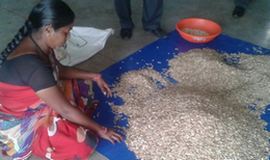
Seeds are selected at Bejo-Sheetal in Aurangabad. Source: Ruchi Narang, IFPRI
How to fast track the development and release of improved varieties of seeds in Nepal? What are quality assurances? How to attract private sector investment in commercial seed production there?
At the beginning of this month, IFPRI South Asia organized a 10-day seed sector study tour in India for a delegation of seed experts from Nepal who wanted answers to those questions. The tour began in Delhi and the delegation was to visit the National Seed Corporation of India (NSC) Vegetable Seed Processing Unit in Agra, then move on to seed testing and seed processing equipment units in Ambala, followed by a visit to MAHYCO, a leading seed national seed company facility , Bejo Sheetal Seeds in Aurangabad and Namdhari Seeds and Indo-American Seeds Labs in Bangalore.
India has emerged as a major player in the global seed trade. The systems and infrastructure for seed production, processing and distribution are well developed and geared toward addressing the needs of farmers.
“The visit by the seed sector stakeholders from Nepal will provide a good opportunity for them to develop their own systems,” said Dr. Anjani Kumar, an IFPRI Research Fellow. He added that the tour would help to develop better seed policies and strategies for high seed replacement in Nepal.
The tour kicked off with an overview by the team from the NSC of the seed sector in India and its progress. It was apparent that quality seed alone can increase the productivity of different crops by 15-20 per cent. The NSC team said that, despite significant progress in this sector, policies to restructure quality assurance and enhancement, increase seed testing labs, ensure seed certification, provide financial incentives to small and medium seed companies to reach out to difficult areas, and moderate public sector seed units are necessary steps toward greater seed security in India.
The study tour is part of the ongoing USAID-funded Policy Reform Initiative in Nepal. As part of the capacity strengthening, another study tour on Plant Quarantine for Nepal delegates began on September 3. The aim of this tour is to help the Government of Nepal to enhance the capacity of its National Plant Quarantine Program (NPQP) in standards/guidelines preparation and implementation of the quarantine-related inspection and certification programs, in line with international practices.


